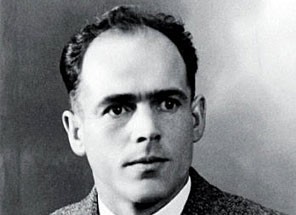By Rose Leigh
Blessed Franz Jägerstätter
Austrian Farmer, Third Order Franciscan, Husband, Father, and Martyr
Born May 20, 1907
Died August 9, 1943
Feast Day: May 21
An Ordinary Life
It’s easy to condemn evil from the comfortable armchair of hindsight. The Nazis were evil. Who in good conscience would have cooperated in their destructive agenda? Surely I wouldn’t have! It’s quite another thing to face the choice either to cooperate with evil, or lose your life.
Franz Jägerstätter was an ordinary Austrian farmer. He was born to unmarried parents in 1907 and was raised by his mother and stepfather. Although he didn’t get an extensive education, he read the newspaper, the Bible, and biblical commentaries.
Franz didn’t lead a saintly life as a young man. Like many young people today, he enjoyed riding his motorcycle and kept company with some wild friends. He even fathered a daughter out of wedlock. But just like St. Matthew, St. Mary of Egypt, St. Ignatius of Loyola, and many holy men and women of the Church, he radically turned his life around through the grace of God and began to take his Faith more seriously.
In 1936, he fell in love and married Franziska Schwaninger. Together they had three daughters and tended their farm. It was a very happy marriage, made even more so by the fact that the two of them supported each other in their Catholic Faith. This would become a great source of strength later in their lives. Franz started receiving Communion more frequently, and eventually became a Third Order Franciscan.
The Nazi Train
Franz voted against Germany’s annexation of Austria, when no one else in his village did so. He was appalled by the Nazis’ amoral policies, such as euthanizing people with mental disabilities, and had become convinced it would be wrong to fight in the German army.
Franz recounted a chilling dream in a 1942 essay he wrote about the Nazi party:
I saw [in a dream] a wonderful train as it came around a mountain. With little regard for the adults, children flowed to this train and were not held back. There were present a few adults who did not go into the area. … Then a voice said to me, “This train is going to hell.”
At this time, many children were being pulled into the Nazi ‘train’ by joining the Hitler Youth, and many adults boarded with them. But Franz would not, and could not, exchange his soul in order to follow that crowd.
After Germany occupied Austria in 1938, Franz refused to cow to the pressure to accept the Nazi Party. He didn’t donate to the Nazis and didn’t accept government subsidies. These little acts of rebellion were quite dangerous in themselves, given that the Nazis weren’t known for their tolerance of dissent.
Franz was initially able to escape active military duty because he was a farmer, but he knew he’d eventually be called up. What should he do? He had three young children and a wife to think of. When he went to a bishop for advice, the bishop (fearing Franz might be a Nazi spy) told him to serve in the army, because it wasn’t the job of a lone citizen to worry about the morality of governmental decisions. He was only one man, after all; what good could he do against the Nazis?
People also told Franz he was being unpatriotic and cowardly, because other Austrian sons, fathers, and husbands were bravely giving their lives in the war. Many of them were Catholics and had no ethical qualms about fighting for Germany. Should Franz refuse to do his duty alongside them?
Against the Current
We often see beautiful portraits of martyrs where they seem to be oozing holiness, purity, and unflappability out of their ears. It’s hard to imagine them doing the dishes or going to work. Of course, they were holy, but they were human beings too. And suffering hurts. Making the decision to give up your normal life, your job, your family, your hobbies, and everything you own for what is right is difficult, even if you love and believe in Jesus.
As you read this article, many Christians across the world are facing the decision to either shrug and go along with what they know to be wrong, or to risk their lives, livelihood, and lifestyle for the truth. There are many Christians today who support immoral causes, still more who quietly acquiesce with the current of popular opinion. The ones who dissent are often scorned or face worse consequences. In many countries, being found to be Christian is dangerous, if it isn’t an outright death sentence.
But Franz went against the current and refused to fight for Germany, saying that his religious views conflicted with Nazi policies. He was willing to be a paramedic, but he couldn’t in good conscience fight for the Germans. The Nazis didn’t accept this as an excuse for his unwillingness to serve and imprisoned Franz for a time. Left alone with their daughters, Franziska bore poor treatment from her neighbors because of Franz’s actions, but she still wrote him letters of encouragement to trust in God’s will.
At Franz’s eventual trial, the Nazis sentenced him to death. He was executed on August 9, 1943. The prison chaplain noted how peaceful and prayerful Franz was as he went to his death.
The Vatican’s biography of Franz includes a quote from Franz written the morning of August 9:
“If I must write… with my hands in chains, I find that much better than if my will were in chains. Neither prison nor chains nor sentence of death can rob a man of the Faith and his free will. God gives so much strength that it is possible to bear any suffering…. People worry about the obligations of conscience as they concern my wife and children. But I cannot believe that, just because one has a wife and children, a man is free to offend God.”
Pope Benedict XVI beatified Franz in 2007. His elderly widow Franziska, his four daughters, and many other family members were present.
Even if you and I aren’t called to martyrdom, we can still be courageous and bear witness to the Gospel even when it causes mild inconvenience or scorn. Being faithful in small matters—telling our friends about Jesus, standing up for the Faith, etc.—is still a difficult task for many people, but it is the first step toward being faithful in larger matters. For we all yearn to hear our Master say, “Well done, my good and faithful servant,” and join with all the saints in sharing in the Lord’s joy.
Bl. Franz Jägerstätter, pray for us!
Read more about Franz Jägerstätter:
- Biographies of Franz from the Vatican website, UCA News, Franciscan Tradition, Simply Catholic, and Clinging to Onions
- Article about Franz from National Catholic Register that mentions some differences between the 2019 film A Hidden Life and his real life, and the influence of Franz’s story on Vatican II’s decision about conscientious objection
- Article about Franz’s beatification ceremony

Rose Leigh
Rose has been drawing and writing since she could hold a pencil, creating worlds of giants, fairies, and adventurers from her imagination. She works as a graphic designer and loves discussing the good and creative aspects of literature, art, and film.






0 Comments